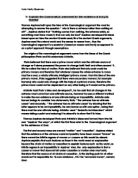Explain the main challenges to the arguments for the existence of God
Explain the main challenges to the arguments for the existence of God (35)
Society is becoming increasingly secular, and many view scientific proof with more regard than the traditional arguments for the existence of God. It has often been said that belief in God is, “morally intolerable, intellectually superfluous and emotionally dispensable.” In examining challenges to the arguments for the existence of God, a good place to start is exploring the shortcomings of the teleological argument.
The argument can be divided into two main sections that are closely interlinked: ‘qua purpose’ and ‘qua reality.’ Starting with qua purpose, this branch argues that everything in the universe was designed to fulfil a purpose. The other form, qua reality, suggests there is evidence for a creator in the regularity of the universe. Hume worked on his critique of the teleological argument for some 25 years, culminating in his book, Dialogues concerning Natural Religion. Our world is not like a machine at all since it is composed of vegetables and animals. It is more organic than it is mechanical. Hume also pointed out that intelligence is not the only governing principle behind the world, there are others such as: generation, vegetation, and gravity. So why should one of these not be the dominant principle? Indeed why should different principles not rule over their own natural domains: vegetation in plants, generation in animals, gravity in the movement of the planets? We cannot project from one limited area to another part or to the whole of nature.









